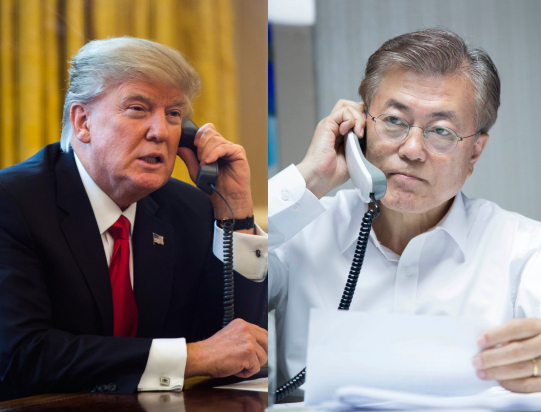One month into his presidency, President Moon Jae-in faces a critical early test as the diplomat in chief with his upcoming first summit with his US counterpart Donald Trump which would set the tone for the alliance over the next few years.
Amid concerns over a drawn-out vacuum, Moon set out to kick-start summit diplomacy immediately after taking office, speaking with Trump and other world leaders on the phone, dispatching special envoys to key partner states and arranging early summits.
 |
(Yonhap) |
Then the nascent administration kindled controversy with a surprise announcement that the Defense Ministry had deliberately concealed in its report to Cheong Wa Dae that four launchers of the US’ Terminal High Altitude Area Defense system have been brought to its site in addition to the existing two and a radar already deployed.
Following a probe, the presidential office shunted off the deputy defense minister and suspended the deployment process until a full-blown environmental assessment on the site is carried out, which is expected to take at least one year.
The move, which virtually defied the allies’ decision to complete the system’s installment within this year, prompted criticism from not only opposition lawmakers and many scholars here but also some leading US politicians. Democratic Senator Dick Durbin, who met with Moon during his visit here last week, said he fears that the liberal president may think he has a “better chance” working with China than the US to contain North Korean threats. Rep. Ed Royce, a Republican who chairs the House Foreign Affairs Committee, issued a statement calling for a “quick and thorough review” to dispel environmental concerns and stressing THAAD’s effectiveness in protecting South Korea from the North’s threats.
With the controversy showing little signs of abating, Seoul made assurances it will not upend the rollout decision.
Just a couple of weeks ahead of the summit, Cheong Wa Dae faces a daunting task: it will have to keep the issue at bay. The two presidents are supposed to build a personal rapport and facilitate policy cooperation in particular on North Korea during the meeting, instead of divulging friction as forecast by skeptics.
Concerns persist the two leaders may clash in coordinating their approaches toward the Kim Jong-un regime, with Moon seeking to reopen dialogue and Trump vowing to maximize sanctions and pressure until the unruly state makes a meaningful commitment to denuclearize.
Another potentially explosive factor is the personal characteristics of Trump, who has a history of making offhand bombshell remarks, such as his demand in an April press interview that Seoul pay $1 billion for THAAD. He discussed the suspended deployment as part of his meeting Thursday with Secretary of State Rex Tillerson and Defense Secretary Jim Mattis, the State Department said.
Yet Moon does not even have a foreign minister in place, as opposition parties refuse to approve his nominee Kang Kyung-wha who struggled to clear some allegations of irregularities during her confirmation hearing Wednesday. Kim Ki-jung, a deputy chief of the presidential National Security Office who had been engineering Moon’s visit plan, resigned early this week amid rumors about his sexual misconduct while teaching at a top Seoul university.
“There have been precedents where summits between a US Republican and a South Korean liberal due to a discord in their views on North Korea,” Chun Yung-woo, a former presidential secretary on foreign affairs and security who now chairs the Korea Peninsula Future Forum in Seoul, said in a commentary.
“The core objective of the forthcoming summit is to recover trust about the alliance and coordinate solutions to the North Korean nuclear problem. With Moon’s attitude toward THAAD at the center of the trust crisis, a starting point should be to settle on the deployment issues.”
Cheong Seong-chang, head of unification strategy at the Sejong Institute, was more upbeat about the summit, saying the two leaders share the basic policy direction on North Korea that they will boost sanctions first and seek talks later.
“The Trump administration’s ‘maximum pressure and engagement’ policy does not necessarily contradict Moon’s pursuit to improve cross-border relations,” Cheong said in a report released Friday.
“Given that US Ambassador Nikki Haley has also mentioned it would explore dialogue if the North halts nuclear development and weapons tests, should such action materialize, South Korea, the US and China will need to have consultations in earnest about their next steps.”
By Shin Hyon-hee (
heeshin@heraldcorp.com)








